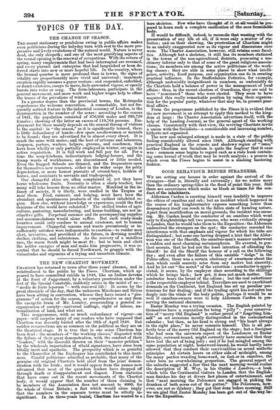TOPICS OF THE. DAY.
THE CHANGE OF SEASON.
Tire-recent stationary or pendulous swing in public affairs makes even .politicians dmeng-the holyday turn with zest to the more pro- gressive and lively evolutions of the natural world: Nature is never
dead, she only sleepeth L and one of the most gratifying aspects, of the vernal opening is the renewal of occupations. With the return of spring, many employments that had been interrupted are resumed, and every pursuit and enterprise that had languished or been de- ferred starts into new or more hopeful life. In the country, where the brumal quarter is more profound than in towns, the signs of vitality are proportionably more vivid and universal: inanimate creation rapidly assumes a gayer vesture ; and suspended, enfeebled, or dumb existence, essays to move, feels unwonted vigour, or openly bursts into voice or song. The farm-labourers, participate in the general movement, and more work and higher wages help to efface the traces of the privations of winter. In a greater degree than the provincial towns, the Metropolis
experiences the welcome renovation. A remarkable,, but not fre- quently noticed feature in the industrial economy of London, is the disproportion in the number of the sexes : according to the census of 1841, the population consisted of 876,956 males and 996,720 females ; showing of the latter an excess of 119,764 persons. Em- ployment for these mainly depends on the annual throng of visitors to the capital : in " the season as, it is significantly termed, there is little redundancy of hands—few spare needlewomen or menials to be. found; they are advertised for in almost every street. It is much the same with males; and_ the host of artisans andlabourers, shopmen, porters, waiters, helpers, grooms, and coachmen, that have been wholly or only partially employed in winter, are again in active requisition. It is full work and fullpay for all. For a time the soup-kitchens, indiscriminate lodging-houses, and the tramp wards of workhouses, are discontinued or little needed. Even the Ragged Schools are thinned, and the frequenters open for themselves new resources, either in the wider scope for petty depredation, or more honest pursuits of errand-boys; holders of horses, and assistants to servants and tradespeople.
Our changeful skies are often complained of, yet they have
borne wholesome fruits. Necessity is often a sharp• teacher, but many will take lessons from no other master. Mankind in the in- fancy of society,. it is likely, were cradled in the Tropics or near them. Food, raiment, and lodging, must have been the abundant and spontaneous products of the earliest inhabited re- gion. How else, without knowledge or experience, could the first denizens of the world have subsisted ? The skilled trades of agri- culture, pasturing, manufacturing, and house-building, are not in- stinctive gifts. Perpetual summer and its accompanying supplies and -accommodations would alone suffice. But such ready-made bounties could- only conducts to animal existence; not to human improvement. Changeful. seasons and wants precariously or in- sufficiently satisfied were indispensable to exertion—to render men alert, inventive, and provident of the future, in devising needful shelter, clothing, and subsistence. As the nursery of a mindless race, the warm South might be most- fit ; but to train and elicit the nobler energies of man and make him progressive, it was es- sential that he should be forced Northward, to grapple with the vicissitudes and urgencies of a trying and -uncertain climate.


























 Previous page
Previous page